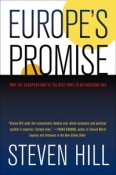Q&A: Election Reflections with Rob Johnson and Sherle Schwenninger
Written on November 13th, 2012 |
Aired 11/11/12
I will reflect on Tuesday’s election with ROB JOHNSON of the INSTITUTE FOR NEW ECONOMIC THOUGHT and SHERLE SCHWENNINGER of NEW AMERICA FOUNDATION.
Asking things like: Who does the campaign and the result say we are as a nation or a culture? Where are we likely to go from here? What does the election mean — in the broadest sense: about money, politics, power, media, culture, parties, movements, as well as in relationship to Europe, China, the Middle East, and the rest of the world?
We’ll talk about the (ideal) (evolving) (actual) role of the United States in the unfolding global story.
Q&A: John Warner/Paul Anastas – founders Green Chemistry and co-authors of Green Chemistry
Written on November 23rd, 2010 |
Aired 11/21/10
JOHN WARNER and Paul Anastas are the founders of green chemistry and co-authors of Green Chemistry: Theory and Practice, in which, they establish 12 guiding principles for chemists. In 1996 Warner left a lucrative job at Polaroid to found the nation's first doctoral program in green chemistry, and in 2007 he founded Warner Babcock Institute for Green Chemistry, an innovation incubator, in Wilmington, Mass.
Green Chemistry is a revolutionary approach to the way that products are made; it is a science that aims to reduce or eliminate the use and/or generation of hazardous substances in the design phase of materials development. It requires an inventive and interdisciplinary view of material and product design. Green Chemistry follows the principle that it is better to consider waste prevention options during the design and development phase than to dispose or treat waste after a process or material has been developed.
Q&A: STEVEN HILL, Author – Europe’s Promise
Written on June 2nd, 2010 |
Aired 05/30/10
We're hearing a lot about the trouble Europe is in. The debt crisis in Greece, and perhaps Spain, Portugal, and Italy, is threatening the Euro and the European Union. What's really going on? How did it happen? How bad is it? How will they deal with it? And what does it mean for the rest of the world and for the US in particular?
We'll deal with those issues this Sunday, but that's not all. While the bad news of this Euro crisis makes headlines in the US, a quiet and successful revolution taking place in Europe does not. Europe seems to be finding a way to make capitalism and democracy work for people, not just for corporations. I think this is a critical unreported story in terms of its potential impact. Here's just a few things you may not have heard about.
The European Union, 27 member nations with a half billion people, has become the largest, wealthiest trading bloc in the world, producing nearly a third of the world's economy - nearly as large as the U.S. and China combined. Europe has more Fortune 500 companies than either the US, China or Japan.
European nations are rated by the World Health Organization as having the best health care systems in the world. Yet they spend far less than the United States for universal coverage, even as U.S. health care is ranked 37th.
Europe leads in confronting global climate change with renewable energy technologies like solar and wind power, conservation and "green design," creating hundreds of thousands of new jobs in the process. Consequently, Europe's ecological "footprint" (the amount of the earth's capacity that a population consumes) is about half that of the United States for the same standard of living.
